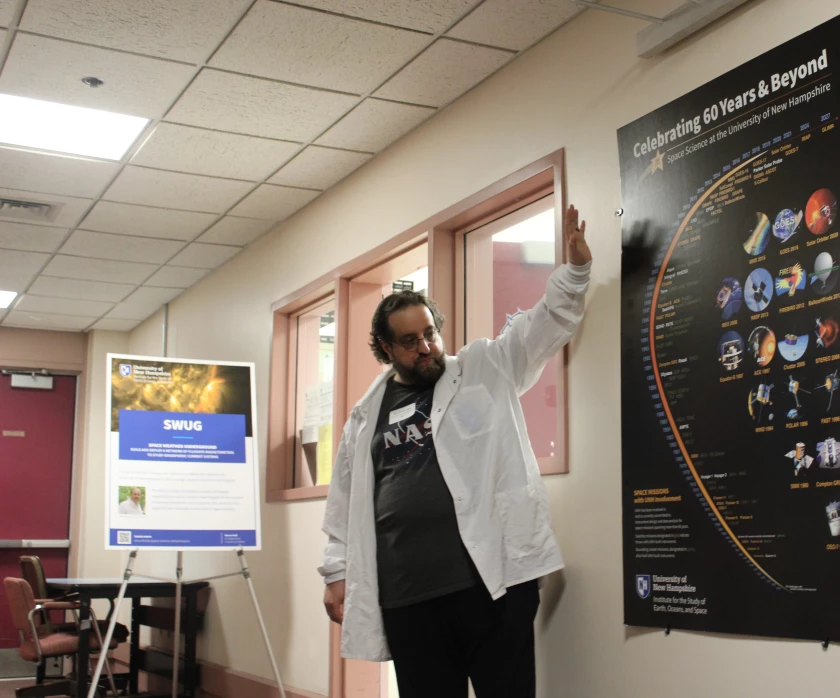Story by New Hampshire Public Radio
When you think of New Hampshire, a rapidly growing space economy might not immediately come to mind. The University of New Hampshire is aiming to change that perception with the opening of the region’s first space tech hub.
This new facility marks a major step forward for the Northeast’s space sector, promising to provide cutting-edge expertise and equipment to the burgeoning commercial space industry, while also creating a student-to-workforce pipeline through training opportunities to develop a new generation of space professionals.
David Hertzler, a systems engineer at the UNH Space Science Center, shows off an exhibit celebrating the university’s involvement in NASA missions over the years. Photo/Sadaf Tokhi, NHPR
The hub builds on the university’s history of collaboration with NASA and other agencies, where university researchers have been involved in more than 100 space and rocket missions.
Space Technology Hub director Reka Winslow said the idea for the hub was born during the development of the iMap low instrument, a $3 million instrument developed for NASA’s iMap IMF mission to help researchers better understand the bubble-like heliosphere that surrounds and protects our solar system. The project faced many challenges, including supply chain issues and obsolescence of previous parts.
“As we’re working through some of these challenges, it got me wondering how the commercial space sector is going to deal with them,” she said. “Do they have similar challenges? What are they doing to solve them?”
After reaching out to stakeholders in the commercial space sector, Winslow learned that while they face similar challenges, there are others. Winslow found there was a lack of accessible, affordable solutions for companies to access space testing services. Many companies face long wait lists and travel times to access these facilities.
The anechoic chamber was one of the facilities showcased at the Space Technology Hub’s opening event. The insulated chamber simulates the silence and electromagnetic conditions of space for equipment testing. Photo/Sadaf Toki, NHPR
She also thought that many of the university’s skilled engineers could help fill gaps in the private sector.
“We have a lot of great resources within the university in the space sciences that haven’t been available to commercial companies before,” Winslow said, “so we want to bring those resources together to really build a space economy here in New Hampshire and really be able to support these startup companies.”
She says the hub should be thought of as a collaboration centre where academic and commercial sectors can work together to mutual benefit.
Hanover-based engineering company Creare is already using the facility to develop space equipment for a mission to Saturn’s largest moon, Titan, in 2028.
Lucas O’Neill, research and development engineer at Clare, said the tests had been extremely challenging to carry out, and although there are companies offering this service nationally, the team found that the Space and Technology Hub had the equipment and expertise best suited to their needs, with the added benefit of being local.
“They really understood what we wanted,” he said. “They had the equipment and the qualifications to fit our needs. It just seemed like a really good fit.”
The hub’s opening event this week showed off some of the equipment capable of simulating conditions in space, including a thermal vacuum chamber and an anechoic chamber.
The launch event also featured engineers and experts with decades of mission expertise, such as Stanley Ellis, research project engineer at the University of New Hampshire’s Space Science Center.
Ellis, who began working at the University of New Hampshire as a physics student and has more than 30 years of experience, fondly recalls standing under the 17-ton space shuttle Atlantis and traveling across the country leading up to its launch, said many people don’t realize the role New Hampshire has played in space science for many years.
“When I tell people about what we do at the Space Science Center, they often say, ‘Really? I didn’t know we were building spacecraft at the University of New Hampshire,'” he says. “So it’s really great that Reka has put together the hub and gotten the word out that this is what we do and this is what we can do. We have a lot of expertise and we can share it with industry to do even more amazing things.”
David Hartzler, a systems engineer at the University of New Hampshire’s Space Science Center, said there are advantages to having such a facility with cutting-edge capabilities in New Hampshire.
“You don’t have to go to a NASA center to do this testing,” he said. “If you can do it in your own facility and quickly fix any issues you find and get it back up and running, you’ll be a lot more competitive, you’ll work faster and you’ll innovate better.”
These stories are shared by our partners at The Granite State News Collaborative. For more information, visit collaborativenh.org.

